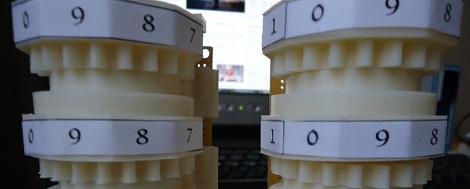Here’s a 3D printed electromechanical computer built by [Chris Fenton] over at NYCResistor. It uses plastic registers printed on a Makerbot, a bunch of pogo pins, and business-card sized punch cards capable of storing 32 bits of instructions and data.
In case you’re wondering, this isn’t the first time we’ve seen [Chris]’ FIBIAC. Since the last update, [Chris] managed to get a program that walks through the first three digits of the Fibonacci sequence. There’s really no limit to what the FIBIAC can theoretically do, but with only three registers he’s limited to calculating the first three digits of pi.
With more registers, [Chris]’ computer could be expanded, but each register takes about 8 hours to print. We’re sure [Chris] would gladly accept any donations of additional 3D-printed registers, so if you’d like to make a few of these gear registers you can get the files on Thingiverse.
As a proof of concept, [Chris]’ FIBIAC is amazing, but it doesn’t live up to its intended design. The punch card format [Chris] created is capable of storing 8 registers, and the registers themselves can be expanded far beyond their current 3-digit width. Still, it’s an incredible build and has the bonus of being easily expandable thanks to a very clever design.











